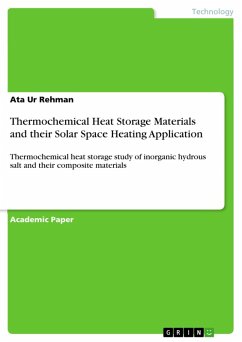
The Heat Pump. A Technical Look (eBook, PDF)

PAYBACK Punkte
0 °P sammeln!
Seminar paper from the year 2021 in the subject Engineering - Power Engineering, grade: 1,3, Technical University of Munich, language: English, abstract: In this paper, the principle of heat pumps will be looked at and discussed more in detail. Heat pumps can play an important role in the transformation towards reducing greenhouse gas emissions and energy consumption, due to their ability to lift low-grade environmental heat with power to a temperature level useful in buildings. They are efficient in providing heat when implemented correctly and can also provide demand response. Thus, heat pum...
Seminar paper from the year 2021 in the subject Engineering - Power Engineering, grade: 1,3, Technical University of Munich, language: English, abstract: In this paper, the principle of heat pumps will be looked at and discussed more in detail. Heat pumps can play an important role in the transformation towards reducing greenhouse gas emissions and energy consumption, due to their ability to lift low-grade environmental heat with power to a temperature level useful in buildings. They are efficient in providing heat when implemented correctly and can also provide demand response. Thus, heat pumps are able to provide, compared to other heating systems, significant carbon savings that are even expected to rise further in the future. Reducing greenhouse gas emissions and energy consumption poses one of the major issues that has to be dealt with at present. National and international climate change objectives demand a significant reduction in all sectors Along with the increasing expectations of reducing greenhouse gas emissions, these global targets are causing a change in our energy system. The demand for energy-efficient and cost-effective systems have risen due primarily to dwindling resources causing increasing energy costs. To deal with these issues, the focus shifts more and more towards phasing out fossil fuels and replacing them with electrical energy systems powered by renewable intermittent energy sources, such as sun and wind, to decrease our reliance on fossil fuels. One way to heat buildings more efficiently is the use of a heat pump. Heat pumps have become popular in Germany, by now, over 1 million have been implemented.
Dieser Download kann aus rechtlichen Gründen nur mit Rechnungsadresse in A, B, BG, CY, CZ, D, DK, EW, E, FIN, F, GR, HR, H, IRL, I, LT, L, LR, M, NL, PL, P, R, S, SLO, SK ausgeliefert werden.













